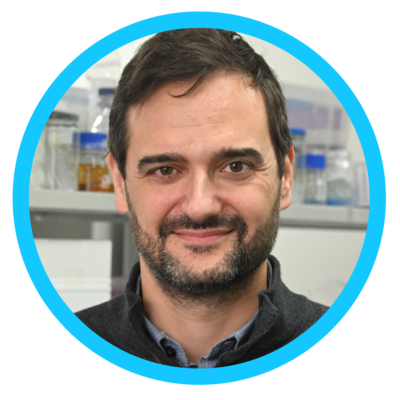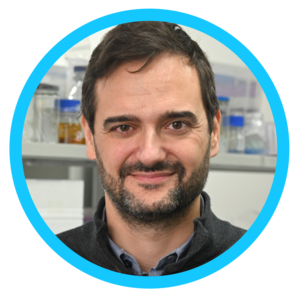
Conference
ASOBIOTICS 2024
Antibiotics and microbiome editors based on programmable targeting of RNA
The symposium, taking place September 12-13 in Würzburg, Germany, tackles challenges in advancing ASOs from research to practical solutions against antimicrobial resistance and emerging infections.
SpeakersLocationScheduleContact
Antisense technologies have the potential to form a foundation for the development of a new generation of antibiotics. Upon delivery into the bacterial cell, short antisense oligonucleotides (ASOs) or mimics thereof can directly modulate bacterial gene expression. The programmable nature of ASOs, which is based on simple base-pairing rules, allows rational and specific drug design. This opens myriad applications including the rapid development of ASOs that can kill emerging pathogens, sensitize drug-resistant strains, or block expression of key virulence factors—all while sparing the native microbiome. However, despite ample proof-of-concept for efficacy against a diverse range of bacterial pathogens in vitro and in vivo, ASOs are yet to advance to the point of drug approval.
The international symposium ASOBIOTICS 2024 will provide a forum to discuss the challenges of progressing antibacterial antisense oligonucleotides (ASOs) from a promising area of research to an applied technology capable of addressing the growing antimicrobial resistance crisis and providing solutions for the analysis of genetically intractable microbes.
Session topics will include: RNA target selection and ASO design, evaluation of ASO chemistry, delivery technologies and bacterial uptake mechanisms, and applications to model microbes, microbial consortia and phages. ASOBIOTICS 2024 will offer ample opportunities for informal discussion amongst participants, with the aim of connecting the global community working on antimicrobial ASOs.
The symposium, organized by the Helmholtz Institute Würzburg, will take place from September 12 to 13 in Würzburg, Germany. Registration is no longer possible.
Our Speakers
Nuno F. Azevedo - University of Porto, PT

Nuno Azevedo © FEUP (Faculdade de Engenharia - Universidade do Porto)
Nuno Filipe Azevedo is currently an Associate Professor at the Faculty of Engineering of the University of Porto (FEUP, Portugal) and a Senior Researcher at Laboratory for Process Engineering, Environment and Energy (LEPABE). His main research interests are to explore the potential of nucleic acid mimics (NAMs) for the rapid diagnosis and treatment of bacteria and multispecies biofilms. He was the PI of the EU-funded project DelNAM, a project that started employing vectors such as liposomes for the delivery of antibacterial NAMs into bacterial cells and biofilms. Currently, he is involved in the EU-funded e.Biofilm project that aims to characterize, engineer and model multispecies biofilms taking into account the spatial structure of the microbial community. Understanding the development of biofilms can help to improve control strategies for biofilm-related infections.
Lars Barquist - University of Toronto, CA

Lars Barquist © Nik Schölzel
Lars Barquist's research group works on the development of new statistical, bioinformatic, and visualization approaches to functional genomics data. They bring together sequencing data and new computational technologies to provide new insights into bacterial pathogenesis and advance RNA-based therapeutics.
Franziska Faber - University of Würzburg, DE

Franziska Faber © Nik Schölzel
Franziska Faber's research group investigates the interplay between the enteric pathogen Clostridioides difficile and the intestinal microbiota. They seek to better understand the RNA-based mechanisms controlling virulence during these interactions. The goal is to leverage this knowledge for the development of novel RNA-based antimicrobials.
Bruce Geller - Oregon State University, US

Bruce Geller © Rachel Haylie Photography
Bruce Geller (Professor Emeritus at Oregon State University) and his lab personnel established much of the foundational work for antibacterial phosphorodiamidate morpholino oligomers (PMOs). This included improvements in uptake into bacterial cells by conjugating PMOs to cell penetrating peptides, demonstration of the mechanism of action of PMOs and efficacy in multiple mouse models of infection, and the identification of a mechanism of spontaneous resistance to peptide-PMOs (PPMOs). In the later part of his academic career, his lab collaborated with the lab of David Greenberg to establish the use of PPMOs to inhibit antibiotic resistance genes and restore susceptibility to MDR pathogens. Drs. Geller and Greenberg co-founded Silentium Biosciences, Inc. to commercialize antibacterial PPMOs, and are actively involved in the company’s development of its antisense therapeutics.
David Greenberg - UTSW Dallas, US

David Greenberg © UTSW (University of Texas Southwestern)
David Greenberg, M.D., is Professor of Infectious Diseases and Microbiology at UT Southwestern Medical Center. He is also a Distinguished Teaching Professor and received numerous teaching awards. After graduating from the Johns Hopkins University, he returned to Houston to attend Baylor College of Medicine where he completed medical school, an internal medicine residency and served as a Chief Resident. Dr. Greenberg then received his Infectious Diseases training at the National Institutes of Health and joined the faculty at UT Southwestern in 2010. His research interests revolve around the increasing crisis of antibiotic resistance. He is actively involved in developing innovative strategies to develop new therapeutics to combat drug-resistant bacteria utilizing antisense modalities. He is a leading international researcher in the use of peptide-conjugated phosphorodiamidate morpholino oligomers as pathogen-specific antibiotics and has published widely in this field. Dr. Greenberg, a Fellow in the Infectious Diseases Association of America, serves as a reviewer for numerous Infectious Diseases journals and is an author for one of the leading Infectious Diseases textbooks.
Hans Maric - RVZ, University of Würzburg, DE

Hans Maric © Daniela Diefenbacher / RVZ
At the Rudolf-Virchow-Zentrum (Würzburg, Germany), the Emmy Noether group lead by Hans Maric employs miniaturized automated and parallel combinatorial synthesis for the in vitro evolution of peptidic molecules. The lab recently achieved the efficient production of Peptide Nucleic Acids (PNAs) in library format and directly screening them for antisense oligonucleotide (ASO) activity blocking the mRNA of essential bacterial genes. The team now aims to deepen their understanding of the structural requirements for PNA uptake as well as potency and leveraging these insights to introduce novel building blocks for the combinatorial screening of improved analogues.
Peter Nielsen - University of Copenhagen, DK

Peter E. Nielsen © Peter E. Nielsen
Peter Nielsen is full professor at the University of Copenhagen (Denmark) since 1995. He is one of the inventors of peptide nucleic acid (PNA) (1991), and has further studied and developed this DNA mimic during the last 32 years in relation to chemistry, origin of life, molecular biology and drug discovery. In 1998 his group introduced the PNA antisense antibiotics concept, and subsequently improved the concept to bacterial penetrating peptide-PNA conjugates. Recently, the major focus has turned back to discovery of novel PNA based antisense antibiotics against multidrug resistant bacterial infections, attempting to characterize scope and limitations of this technology in terms of drug discovery/development.
Nadja Patenge - University of Rostock, DE

ASOBIOTICS_Bildergalerie_Patenge_cyan2.png
Nadja Patenge © Anita Thamm
Nadja Patenge’s group at the University Medicine Rostock (Germany) is interested in the regulation of streptococcal virulence and in novel approaches to combat streptococcal infections. Their current focus is on peptide nucleic acid (PNA) antisense technology. A major topic is the optimization of the antimicrobial effect of antisense PNAs on Streptococcus pyogenes and S. pneumoniae by improving bacterial PNA uptake using different carrier molecules. The effects of PNA treatment observed in vitro have so far been evaluated using the invertebrate infection/treatment model Galleria mellonella, the greater wax moth, for ethical reasons. Ongoing projects include off-target effects of PNA treatment on the bacterial transcriptome and the dynamics of resistance development compared to conventional antibiotics.
Oliver Seitz - Humboldt University Berlin, DE

Oliver Seitz © Oliver Seitz
Oliver Seitz is Full Professor at the Humboldt-Universität zu Berlin, Germany. He obtained his PhD from the University of Mainz in 1995. After postdoctoral research at the Scripps Research Institute in La Jolla (California), he moved to the University of Karlsruhe. In 2000, he became group leader at the Max-Planck Institute of Molecular Physiology in Dortmund, Germany, before he joined the faculty in Berlin. Oliver Seitz has a keen interest in developing nucleic acid and protein chemistry that allows the interrogation and perturbation of cellular and biochemical processes. This includes the chemical biology of posttranslationally modified proteins, peptide- and nucleic acid-templated chemistry, protein imaging and mRNA imaging. He is a recipient of an ERC Advanced Grant and the Max Bergmann Medal.
Joanna Trylska - University of Warsaw, PL

Joanna Trylska © Joanna Trylska
The group of Joanna Trylska at the Centre of New Technologies of the University of Warsaw (Poland) uses both experimental and computational methods to explore antibacterial strategies based on peptides and peptide nucleic acids (PNA). We use PNA oligomers to inhibit various bacterial RNAs and to identify new antibacterial targets. For example, we have discovered that PNA oligomers can activate the toxin-antitoxin systems in E. coli. Additionally, we are searching for PNA carriers to bacterial cells. We found that vitamin B12 and peptide-based iron chelators (siderophore mimics) transport PNA oligomers to E. coli. Furthermore, we design short, amphipathic membrane-active peptides and employ hydrocarbon stapling to stabilize their secondary structure. Such stapling enhances membrane destabilization and penetration, thereby increasing antibacterial activity of the peptides. We are also interested in viral proteases and are investigating how macromolecular crowding affects the dynamics and function of these proteases.
Jörg Vogel - Helmholtz Institute Würzburg (HIRI), DE

Jörg Vogel © Nik Schölzel
Jörg Vogel's research group at the Helmholtz Institute Würzburg investigates the RNA world of microbes during infection and in the context of their natural habitat. Using high-resolution methods, they seek to understand when, how and why bacteria use RNA-based mechanisms to regulate their genes, and exploit this knowledge to develop RNA-based therapeutic approaches.
Eylon Yavin - Hebrew University, Jerusalem, IL

Yavin Eylon © The Israel Cancer Research Fund – ICRF
The lab of Eylon Yavin at the School of Pharmacy, Faculty of Medicine at the Hebrew University of Jerusalem (Jerusalem, Israel) focuses on the development of DNA mimics termed Peptide Nucleic Acids (PNAs) as antisense oligonucleotides (ASOs) and as RNA sensors.
The lab has developed in the past PNAs targeted for cancer therapy (antimiRs and splice switching oligonucleotides) and has put much effort in recent years in developing highly sensitive and selective RNA sensors (termed FIT-PNAs) for the diagnosis of cancer and human pathogens (P. falciparum). Some of our recent work has shown that these RNA sensors are selective to single point mutations that are associated with drug resistance in malaria; a finding that may developed for point of care diagnostics for the benefit of society.













